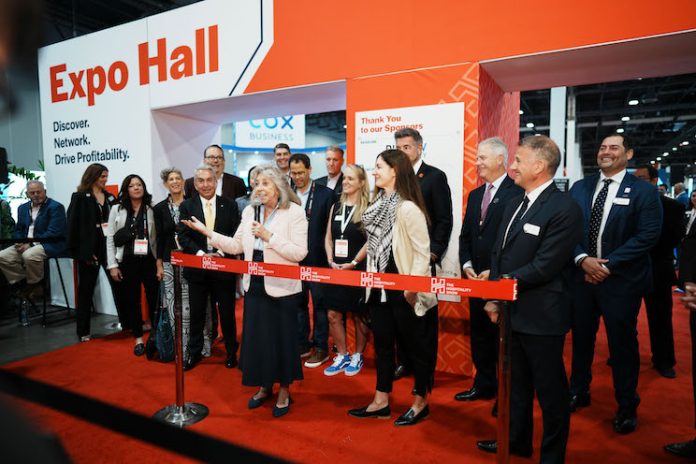The bleisure travel trend, the new normal and updated technology were major points of emphasis during the opening panel discussion at the inaugural Hospitality Show in Las Vegas as executives discussed how today’s customers are changing and expectations have shifted.
John Murray, president/CEO, Sonesta International Hotels; Leslie Hale, president/CEO, RLJ Lodging Trust; and Jay Caiafa, COO, IHG, discussed the aforementioned topics and more during a panel entitled “The Demand Generation: Asking For Everything!”
Caiafa refuted the notion that companies need to talk to the consumer differently.
“Generally speaking I don’t think there’s been a revolution of what the guest expects from us. I think they’ve always expected the same thing. They want a safe experience, they want to feel clean, they want to feel secure, they want their amenities. I think where we’re seeing a difference is they’re a lot more intolerant when either it hasn’t been delivered the right way or they’re surprised by something,” he said.
Caiafa added that in the past if there was a problem it was an opportunity for a hotel to correct it and generate more loyalty, but that has changed. “It’s not really that way anymore because now they’re paying rates that are so high. You combine that with the talent and labor [challenges] and that makes for a very difficult intersection.”
Caiafa continued, “The other thing that has happened as we’re coming out of the pandemic is while many travelers are still skittish, we’ve seen a lot of travelers—particularly on the premium and luxury lifestyle space—really expecting everything to be back to normal. When it’s not they really expect to be told that well before they come to the hotel,” he noted.
Hale emphasized the industry is still finding out exactly what that new normal is.
“It’s important to understand that the new normal is still evolving. We’re trying to see which trends are here to stay and which ones are not. We are still evaluating it,” she said.
She further noted, “We’re really looking at what’s my future mix going to be.”
One trend that has certainly increased momentum is the combination of business and leisure travel, according to Murray, who noted shoulder nights have become more popular.
“We continue to see the patterns of bleisure travel much stronger than we’ve seen before,” he said.
“Thursday used to be a check-out day now it’s a check-in day,” noted Hale.
The executives also discussed changing technology and its impact on the customer experience.
“The way people book and keep up with travel is just fundamentally different than it was five years ago. Apps used to be a novelty, now they’re frankly table stakes,” said Caiafa.
Murray added that Sonesta has been experimenting with AI, specifically robots delivering room service and other guest services, at several of its Miami airport hotels.
Meanwhile, a subsequent panel addressed the human trafficking issue and was entitled “The Hospitality Industry vs. Human Trafficking: Marriott and Polaris on Current Trends And Actions To Take.”
Anthony Capuano, president and CEO, Marriott International, framed the discussion and the company’s partnership with Polaris.
“A lot of wonderful things happen in hotels, some of people’s best memories happen in hotels. Sadly, this is one of those not so wonderful things that can happen in hotels. I think it’s as important and noble an effort as we in the industry can take on. This is one issue in the industry that is not a competitive issue. This is an issue that has huge implications for our industry. That has always been our approach. We’re humbled and proud to do whatever we can to be a leader on this issue while bringing our friends and competitors along. As an industry we have an opportunity and responsibility to try and do everything we can to partner with organizations like Polaris and really move the needle in a significant way to try to combat human trafficking,” he said.











